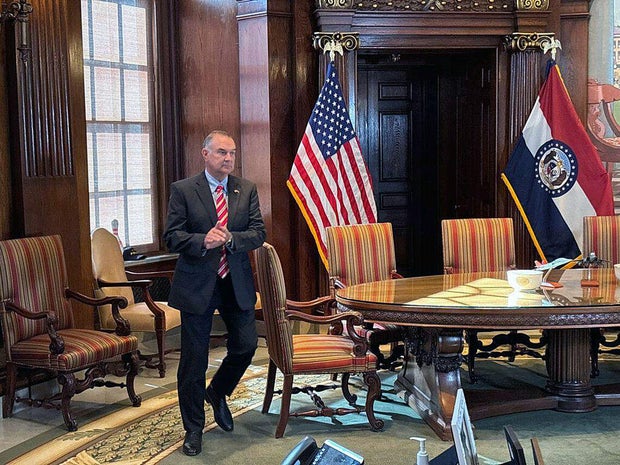In a striking move that epitomizes the current battleground of partisan redistricting in the United States, Republican Governor Mike Kehoe of Missouri announced on Friday plans to call a special legislative session aimed at redrawing the state’s congressional districts. This endeavor stands as part of a broader national trend, mirroring recent actions in states like Texas, where Governor Greg Abbott, also a Republican, recently signed into law a new congressional voting map intended to increase the GOP’s seats in upcoming elections. These developments underscore the intensifying scramble between Republicans and Democrats as both seek strategic advantages for the 2026 midterm elections.
Governor Kehoe’s decision came just hours after the Texas legislation was enacted, signaling a synchronized Republican strategy across state lines. President Donald Trump has actively encouraged such moves, viewing them as essential for maintaining Republican control in the House of Representatives. Missouri now joins the fray as the third state to initiate mid-decade redistricting solely for partisan gains, an approach that was first adopted by Texas and quickly followed by Democratic counter-efforts in California under Governor Gavin Newsom.
The strategic redistricting in Missouri targets specific Democratic-held districts, particularly aiming to dilute the electoral strength of Democratic Representative Emanuel Cleaver in the Kansas City area. By extending Cleaver’s district eastward into more rural, Republican-leaning regions, the proposed map could jeopardize Democratic hold on the seat, reflecting a clear Republican tactic to reshape political landscapes favorable to their party.
In addition to redistricting, Governor Kehoe’s call for a special session, scheduled to commence on September 3, also includes measures to toughen the process for passing citizen-initiated ballot measures. Such measures have previously led to amendments supporting abortion rights and marijuana legalization—topics that have seen popular support but stand counter to the conservative agenda pushed by state Republicans.
The Governor articulated that these measures are a protective stand against what he termed as encroaching liberal ideologies, asserting that Missouri’s inherently conservative values should be reflected uniformly across all levels of governmental representation. This stance has been echoed by other state Republican leaders, including Missouri’s treasurer and lieutenant governor, who have publicly endorsed the drafting of a new, more conservative-friendly congressional map. Their collective intent is clear: to align Missouri’s congressional delegation more tightly with the state’s conservative voter base.
The Republican drive to reshape Missouri’s congressional landscape gained notable backing from former President Trump, who praised the redistricting plan on his platform, Truth Social. Trump emphasized that the redistricting would potentially enable the election of more GOP representatives aligned with his Make America Great Again (MAGA) ideology in the 2026 Midterm Elections.
This Republican push, however, has not gone unchallenged. Democratic representatives and party leaders in Missouri have vehemently opposed the redistricting efforts. State House Minority Leader Ashley Aune criticized Governor Kehoe, labeling him a “Trump puppet” and condemning the redistricting as a ploy to unjustly secure a congressional seat for the Republicans. Aune starkly compared the move to one of the state’s darkest historical moments—when pro-slavery legislators voted for Missouri to join the Confederacy.
Adding his voice to the criticism, Representative Emanuel Cleaver denounced the redistricting proposal as an assault on democratic principles, intended to mute certain voices and deny adequate representation. Despite the severe opposition, the reality of the state’s political composition, where Republicans hold a strong legislative majority, leaves Missouri Democrats with limited options to block the redistricting effort. Unlike similar situations in Texas where Democrat walkouts have delayed proceedings, Missouri’s political machinery is such that even without the full presence of Democratic legislators, the Republican majority can advance their agenda.
This scenario in Missouri is part of a larger national picture where both Republican and Democrat-run states are actively engaging in redrawing congressional districts. Florida and Indiana are among other Republican states considering reconfiguration of their districts, paralleled by Democrat-led initiatives in states like Illinois, Maryland, and New York. All these efforts highlight the escalating stakes and the increasingly strategic nature of district mapping in U.S. politics, serving as a testament to the ever-intensifying partisan warfare that underpins American electoral strategies today.
In a notable precedent-setting case, the practice of partisan gerrymandering has also met judicial scrutiny. For instance, a judge in Utah recently mandated the state’s Republican-led Legislature to redraw congressional districts compliant with voter-established guidelines aimed at curtailing partisan gerrymandering, following findings that lawmakers had disregarded and diluted an independent commission’s efforts.
The maneuvers in Missouri and beyond signal a pivotal moment in U.S. politics where redistricting not only shapes the immediate electoral advantages but also sets the stage for the broader dialogue about the essence of representative democracy and fair play in electoral processes. As the preparations for the 2026 midterm elections heat up, the strategies adopted in Missouri will likely serve both as a model and a cautionary tale for other states navigating the complex terrain of partisan politics and redistricting.









